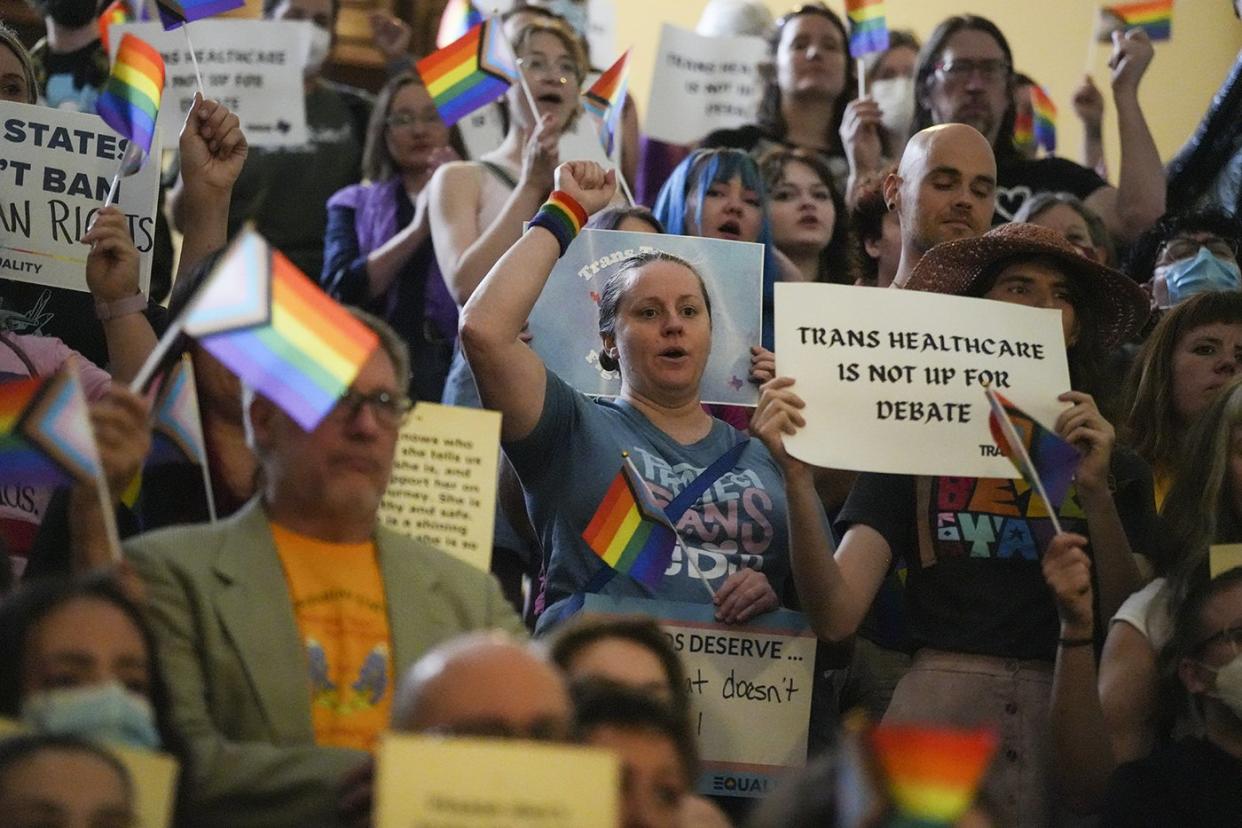Texas Supreme Court upholds ban on youth gender transitions. It's the largest state with such a law

AUSTIN, Texas (AP) — The Texas Supreme Court upheld the state’s ban on gender-affirming care for transgender youths Friday, rejecting pleas from parents that it violates their right to decide on and seek medical care for their children.
The 8-1 ruling from the all-Republican court leaves in place a law that has been in effect since Sept. 1, 2023. Texas is the largest of at least 25 states that have adopted laws restricting or banning gender-affirming medical care for transgender minors.
The Texas law prevents transgender people under 18 from accessing hormone therapies, puberty blockers and transition surgeries, though surgical procedures are rarely performed on children. Children who had already started the medications had to taper off their use.
“We conclude the Legislature made a permissible, rational policy choice to limit the types of available medical procedures for children, particularly in light of the relative nascency of both gender dysphoria and its various modes of treatment and the Legislature’s express constitutional authority to regulate the practice of medicine,” Justice Rebeca Aizpuru Huddle wrote in the court's decision.
The lawsuit that challenged the Texas law argued it devastates transgender teens who are unable to obtain critical treatment recommended by their physicians and parents. The Williams Institute at the UCLA School of Law estimates about 29,800 people ages 13-17 in Texas identify as transgender.
The only justice dissenting with Friday’s ruling said the Texas Supreme Court was allowing the state to “legislate away fundamental parental rights.”
“The State’s categorical statutory prohibition prevents these parents, and many others, from developing individualized treatment plans for their children in consultation with their physicians, even the children for whom treatment could be lifesaving," Justice Debra Lehrmann wrote in a dissenting opinion. "The law is not only cruel — it is unconstitutional.”
A lower court had ruled the law unconstitutional, but it was allowed to take effect while the state Supreme Court considered the case.
Texas’ Republican attorney general, Ken Paxton, vowed in a post on the social platform X after the ruling that his office “will use every tool at our disposal to ensure that doctors and medical institutions follow the law.”
Advocates criticized the ruling.
“It is impossible to overstate the devastating impact of this ruling on Texas transgender youth and the families that love and support them,” said Karen Loewy, senior counsel and director of Constitutional Law Practice at Lambda Legal, which was among the groups that sued the state on behalf of doctors and families.
“Our government shouldn’t deprive trans youth of the health care that they need to survive and thrive,” said Ash Hall, policy and advocacy strategist for LGBTQIA+ rights at ACLU of Texas. “Texas politicians’ obsession with attacking trans kids and their families is needlessly cruel.”
The law includes exemptions for children experiencing early puberty or who have “a medically verifiable genetic disorder of sex development.”
Such exemptions underscore the law's discriminatory nature, said Dr. Jack Drescher, a psychiatry professor at Columbia University who edited the section about gender dysphoria in the American Psychiatric Association’s diagnostic manual. Gender dysphoria is the psychological distress experienced by those whose gender expression does not match their gender identity and is a required diagnosis before treatments can begin.
“They’re saying if you’re not a transgender child and you need these drugs, you can have them, but if you’re a transgender child who might benefit from these drugs, then sorry, you have to move to another state,” Drescher said.
The restrictions on health care are part of a larger backlash against transgender rights, touching on everything from bathroom access to participation in sports. Former President Donald Trump has vowed to pursue other measures that would restrict the rights of transgender people if he wins the November election, including a ban on gender-affirming care for minors at the federal level.
As more states move to enforce health care restrictions, families of transgender youths are increasingly forced to travel out of state for the care they need at clinics with growing waiting lists. At least 13 states have laws protecting care for transgender minors.
Most of the states that have passed restrictions face lawsuits, and the U.S. Supreme Court recently agreed to hear an appeal from the Biden administration attempting to block state bans on gender-affirming care. The case before the high court involves a Tennessee law that restricts puberty blockers and hormone therapy for transgender minors, similar to the Texas law.
Gender-affirming care for transgender youths is supported by major medical organizations, including the American Medical Association, the American Academy of Pediatrics, the American Psychiatric Association and the Endocrine Society.
In a concurring opinion, one justice dismissed the position of the medical groups.
“The fact that expert witnesses or influential interest groups like the American Psychiatric Association disagree with the Legislature’s judgment is entirely irrelevant to the constitutional question," Justice James Blacklock wrote. “The Texas Constitution authorizes the Legislature to regulate ‘practitioners of medicine.’”
Texas officials defended the law as necessary to protect children and noted a myriad of other restrictions for minors on tattoos, alcohol, tobacco and certain over-the-counter drugs.
Several doctors who treat transgender children testified in a lower court hearing that patients risk deteriorating mental health, which could possibly lead to suicide, if they are denied safe and effective treatment.
The ban was signed by Republican Gov. Greg Abbott, the first governor to order the investigation of families of transgender minors who receive gender-affirming care.
___
DeMillo reported from Little Rock, Arkansas.
Jim Vertuno And Andrew Demillo, The Associated Press


